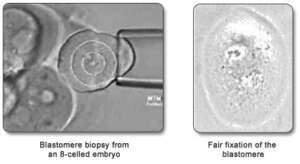Preimplantation genetic diagnosis (PGD) by FISH can be carried out to select embryos free of common chromosome abnormalities, for transfer during an IVF cycle. PGD offers a new alternative to chorionic villus sampling or amniocentesis.
In IVF cases, following embryo biopsy, a single blastomere is fixed on the slide and is subjected to the FISH procedure for study of aneuploidies. We have facilities to detect aneuploidy in 7-11 chromosomes for PGD. The common chromosomes checked for aneuploidies are 13, 16, 18, 21, 22, X, Y, 15, 17, 9, 8 though mosaicism cannot be ruled out. The entire procedure of knowing whether there is a chromosomal aneuploidy in the embryo can be completed within 1-2 days, thus saving the parents months of suspense.

There is considerable need for chromosomal analysis of preimplantation embryos in couples, who carry balanced translocations, in women with advanced age and women with previous children having aneuploidies.
Those having recurrent pregnancy loss, repeated IVF failures or repeated poor quality embryos could also avail of the PGD procedure to select healthy embryos.

Couples, where the male partner has Klinefelter Syndrome may benefit from PGD utilizing FISH.
FISH is also helpful in selecting normal embryos in X-linked genetic disorders.
Abnormal embryos carrying aneuploidies or unbalanced translocations are not transferred during IVF, thus increasing the chances of a successful pregnancy. PGD reduces the need for abortion.
Read more: Dr Firuza Parikh responsible for the first baby born in South East Asia using PGT

